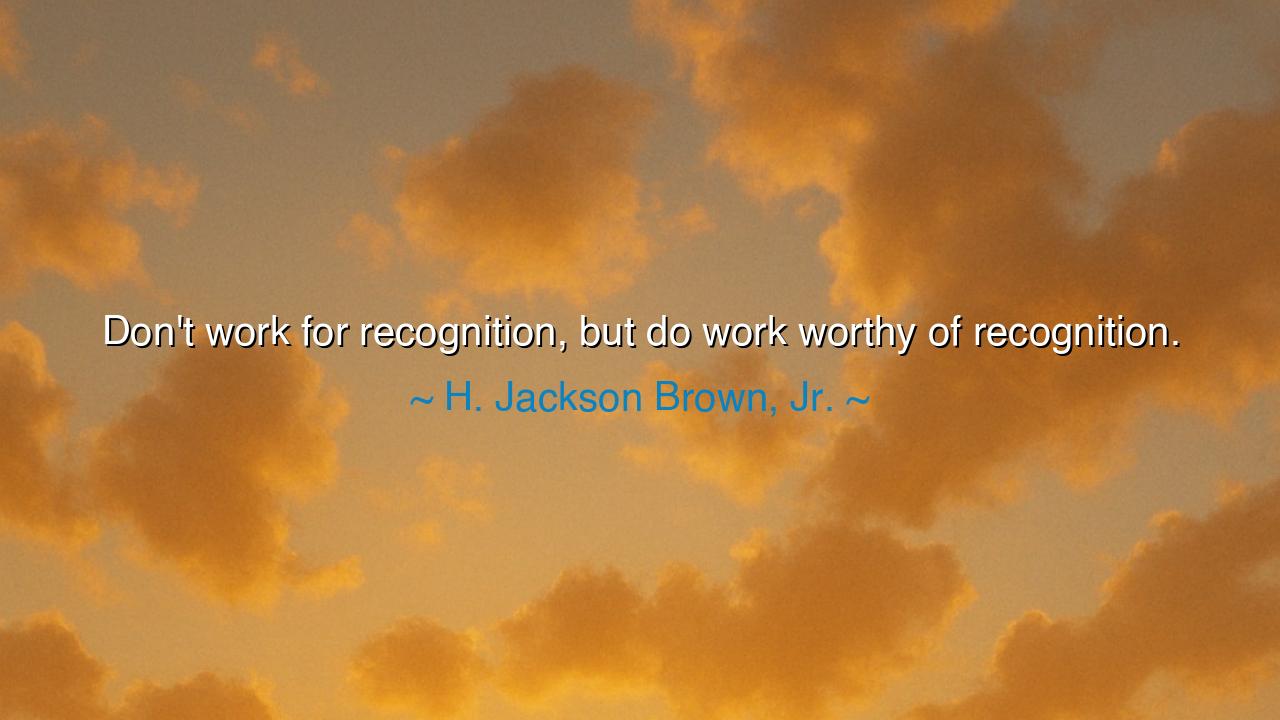
Don't work for recognition, but do work worthy of recognition.






Hearken, children of the ages, to the words of H. Jackson Brown, Jr., who speaks of purpose and integrity: "Don't work for recognition, but do work worthy of recognition." Here lies a teaching of humility and nobility, a reminder that the true measure of labor is not the applause it earns, but the merit it embodies. The wise understand that the spirit is honored not by the gaze of men, but by the enduring value of the deeds performed with sincerity and devotion.
Know that in these words there is clarity and virtue. To seek recognition as the chief reward of effort is to risk corruption of the heart, for vanity and ambition may overshadow diligence and conscience. H. Jackson Brown, Jr. teaches that labor must be pursued for its own sake, guided by principle, and measured by the standards of excellence rather than the fleeting judgments of others.
Yet, consider also the higher calling of work worthy of recognition. Such work is crafted with care, patience, and integrity; it honors truth, benefits others, and leaves a mark that endures beyond the applause of the moment. The ancients would counsel that excellence is a gift to the world and a testament to the discipline of the soul, not a tool for self-glorification.
And behold, there is heroism in this approach. To labor faithfully without desire for acclaim is to embrace humility and courage, to place value in the quality of action rather than the reward it may bring. H. Jackson Brown, Jr.’s insight teaches that the noblest deeds often go unseen, yet their impact is profound and everlasting, shaping lives and leaving a legacy that time cannot diminish.
Thus, remember, future generations: pursue your endeavors not for the eyes of men, but for the strength and excellence they cultivate within you. Strive to create, to build, and to serve with purpose, so that your work itself becomes worthy of recognition, regardless of whether it is acknowledged in the moment.
In the end, the ancients would say: let the measure of your life be the quality of your work, not the accolades it earns. True greatness lies in deeds done with wisdom, courage, and care, and in the knowledge that the heart that labors with sincerity will leave a mark of lasting honor upon the world.






KXTran Kieu Xuan
I love the depth in this quote. It suggests that our work should be driven by a sense of purpose, not by the desire for recognition. But I can’t help but think—what if the lack of recognition leads to discouragement? It’s easy to say not to work for recognition, but when your efforts go unnoticed, it can be disheartening. How do we keep motivated without external validation? Can the satisfaction of doing meaningful work be enough?
AYangel yizk
This quote is an inspiring perspective on work and purpose. By focusing on creating something worthy of recognition rather than just seeking it, we ensure that our efforts are rooted in integrity. But can this mindset be sustained in a world where success is often measured by external rewards? I wonder if this mindset helps protect us from burnout by shifting the focus from recognition to the joy of contributing something valuable.
MLMy Le
H. Jackson Brown, Jr.’s words make me think about the difference between working for the right reasons and working for the wrong reasons. If you constantly seek recognition, are you really focused on the quality of your work, or are you just chasing approval? This quote challenges us to rethink how we define success. But what happens if our work goes unnoticed? Can we still find satisfaction in the act of doing it, or is recognition necessary for validation?
CHNguyen Cong Hai
This quote seems to encourage authenticity in our work. If we focus too much on getting recognized, we may start chasing external validation rather than creating something valuable. But can we truly detach from the desire for recognition, especially in a society that values achievement? I wonder—how do we cultivate a mindset where the process of doing great work is its own reward, not just the outcome of praise or success?
THTran Tien Hung
I find this quote to be a reminder that our true value isn’t determined by recognition, but by the quality of the work we put into the world. But then again, isn’t it human nature to want recognition for our efforts? Does this quote suggest we should disregard the need for acknowledgment entirely, or just focus on doing work that stands on its own merit? How do we navigate the tension between humility and ambition?